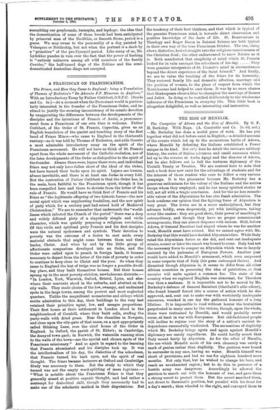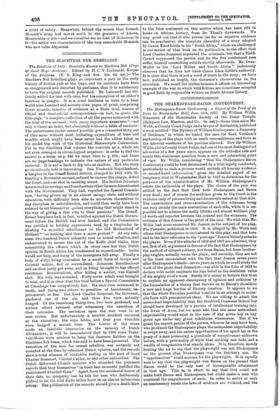THE RISE OF MENELIK.
The Campaign of Adowa and the Rise of Menelik. By G. F. H. Berkeley. With Maps. (A. Constable and Co. 7s. 6d. net.) —Mr. Berkeley has done a useful piece of work. He has put together what did not before exist in English,—a detailed account of the events which led up to the momentous battle of Adowa, where Menelik by defeating the Italians established a Power unique in its kind. Not only does he detail the intricate military history, the series of Italian advances and small successes which led up to the reverse at Amba Apagi and the disaster of Adowa, but he also follows out ia full the tortuous diplomacy of the UCcialli Treaty or Treaties. We are content here to note that such a book does now exist for the advantage of students and for the interest of those readers who care to follow a very curious campaign. It is the pleasanter because Mr. Berkeley has a generous enthusiasm for the valour of the Italians and the native troops whom they employed; and he has many spirited stories te tell, not all with a tragic conclusion. And for the no less remark- able valour of the Abyssinians he has also frank admiration. The book confirms our opinion that the fighting force of Abyssinia is very great. The levies are in a sense undisciplined, but they advance boldly, even desperately, yet with intelligence, taking- cover like snakes : they are good shots, their power of marching is extraordinary, and though they have no proper commissariat arrangements, they can almost dispense with rations. Still, before Adowa, if General Baratieri had stayed where he was for another week, Menelik must have retired. But we cannot agree with Mr. Berkeley that this would have decided Abyssinia's fate. While Italy rated the Abyssinian forces as she did, and sent out inadequate armies, sooner or later the smash was bound to come. Italy had not the necessary force to conquer an Abyssinia which was so largely assisted by the jealousies of European Powers. Another year would have added to Menelik'a armament, which even surpassed in some respects that of Italy (his guns outranged theirs). And disunited though Abyssinia is, it seems to differ from all other African countries in possessing the idea of patriotism, so that enemies will unite against a common foe. The state of the country when we captured Magdala was abnormal, for Theodore was then a madman. It is impossible not to be moved by Mr. Berkeley's defence of General Baratieri (Garibaldi's able officer), who found himself forced into a course of action which he dis- approved, and, sent out to make war with wretchedly inadequate resources, wrecked in one day the gathered honours of a long lifetime. It is impossible to read without horror the brutalities perpetrated in many cases by the victors, though, upon the whole, these were restrained by Menelik, and would probably never recur, at least in war with Europeans. But old-fashioned people will incline to rejoice over the story of a nation's ancient in- dependence successfully vindicated. The accusations of duplicity which Mr. Berkeley brings again and again against Menelik's diplomacy are surely superfluous. He could hardly assert that Italy meant fairly by Abyssinia. As for the affair of Macalle, the use which Menelik made of his own clemency was surely a mark of genius rather than duplicity. The garrison were bound to surrender in any case, having no water. Menelik himself was short of provisions, and had no use for eighteen hundred more mouths. Not only that, but he wished to change his base, and reach an unexhausted region ; but to do this in presence of a hostile army was dangerous. Accordingly he allowed the garrison to march out with the honours of war, and gave them a strong escort to protect them. But the escort marched them, not direct to Baratieri's position, but parallel with his front for a day's march ; then wheeled to the right, and convoyed them to
a point of safety. Meanwhile, behind the screen thus formed, Menelik's army had moved north to the granaries of Adowa. Honourable or not—and we ourselves see no hint of dishonour in it—the action was characteristic of the very remarkable Monarch who now rules Abyssinia.



























































 Previous page
Previous page